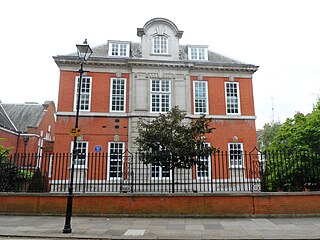
The Bournemouth Symphony Orchestra (BSO) is an English orchestra, founded in 1893 and originally based in Bournemouth. With a remit to serve the South and South West of England, the BSO is administratively based in the adjacent town of Poole, since 1979. The orchestra is resident at Lighthouse in Poole, with other major concert series given at Portsmouth Guildhall, the Great Hall of Exeter University and Bristol Beacon. Shorter series are also given in Bournemouth and Basingstoke.

Grace Mary Williams was a Welsh composer, generally regarded as Wales's most notable female composer, and the first British woman to score a feature film.
Ralph Vaughan Williams dedicated his Symphony No. 4 in F minor to Arnold Bax.
A London Symphony is the second symphony that Ralph Vaughan Williams composed. The work is sometimes referred to as Symphony No. 2, though the composer did not designate that name for the work. First performed in 1914, the original score of this four-movement symphony was lost and subsequently reconstructed. Vaughan Williams continued revisions of the work into its final definitive form, which was published in 1936.
English Folk Song Suite is one of English composer Ralph Vaughan Williams' most famous works. It was first published for the military band as Folk Song Suite and its premiere was given at Kneller Hall on 4 July 1923, conducted by Lt Hector Adkins. The piece was then arranged for full orchestra in 1924 by Vaughan Williams' student Gordon Jacob and published as English Folk Song Suite. The piece was later arranged for British-style brass band in 1956 by Frank Wright and published as English Folk Songs Suite. All three versions were published by Boosey & Hawkes; note the use of three different titles for the three different versions. The suite uses the melodies of nine English folk songs, six of which were drawn from the collection made by Vaughan Williams' friend and colleague Cecil Sharp.

Richard Sidney Hickox was an English conductor of choral, orchestral and operatic music.
Chandos Records is a British independent classical music recording company based in Colchester. It was founded in 1979 by Brian Couzens. Since March 2024, it has been owned by Klaus Heymann.

Sinfonia of London is a symphony orchestra based in London, England, conducted by John Wilson.
Riders to the Sea is a short one-act opera by Ralph Vaughan Williams, based on the play of the same name by John Millington Synge. The composer completed the score in 1927, but it was not premiered until 1 December 1937, at the Royal College of Music, London. The opera remained largely the province of students and amateurs until it entered the repertoire of Sadler's Wells in 1953.
Susan Gritton is an English operatic soprano. She was the 1994 winner of the Kathleen Ferrier Award and has sung leading roles in a wide-ranging repertoire from Handel and Mozart to Britten, Janáček and Strauss.
John Wilson is a British conductor, arranger and musicologist, who conducts orchestras and operas, as well as big band jazz. He is the artistic director of Sinfonia of London.
Philip Prosper Sainton was a British–French composer, conductor, and violist.
The Banks of Green Willow is a piece of orchestral music by British composer George Butterworth. It was composed in 1913, is written in the key of A major, and is around six minutes long.
James Gilchrist is a British tenor specialising in recital and oratorio singing.
Helen Sinclair Glatz was an English composer and pianist, a pupil of Ralph Vaughan Williams, best known for her teaching at Dartington Hall and the Dartington International Summer School for over 40 years.
Roderick Gregory Coleman Williams OBE is a British baritone and composer.
Philip Dukes is a British classical viola soloist.
This is a summary of 1923 in music in the United Kingdom.
Stephen Bryant is an English violinist, best known as the leader of the BBC Symphony Orchestra.

Hammersmith: Prelude and Scherzo, more commonly known as just Hammersmith, Op. 52, is a wind band work composed by English composer Gustav Holst in 1930, with a corresponding orchestral version. Commissioned by the BBC Military Band, the piece is based on Holst's love for the London borough of Hammersmith. The writing is more musically challenging than Holst's other wind band works, and is a wind band essential today. A typical performance runs for 14 minutes.










